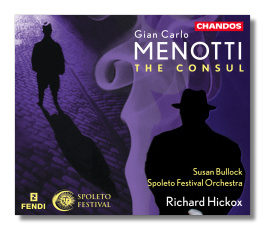
The Internet's Premier Classical Music Source
Related Links
- Latest Reviews
- More Reviews
-
By Composer
-
Collections
DVD & Blu-ray
Books
Concert Reviews
Articles/Interviews
Software
Audio
Search Amazon
Recommended Links
Site News
 CD Review
CD Review
Gian Carlo Menotti

The Consul
- Susan Bullock (Magda Sorel)
- Louis Otey (John Sorel)
- Jacalyn Kreitzer (Mother)
- Charles Austin (Secret Agent)
- Victoria Livengood (Secretary); others
Spoleto Festival Orchestra/Richard Hickox
Chandos CHAN9706(2) DDD 2CDs 69:55, 61:05
In its nearly 50-year history, Gian Carlo Menotti's opera The Consul has been recorded only three times. Two of those recordings have been released in the last five months. How strange is that? The first recording, released (on LPs only) by the American Decca label, was slightly abridged. The present recording, and its immediate predecessor on Newport Classics (NPD 85645/2), are complete, so they would be preferred even if the first recording were still available.
The Consul is a highly melodramatic opera about the dehumanizing effect of bureaucracy; think of Kafka's The Trial, but without the subtlety. The central character is Magda Sorel. Her husband John is a "freedom fighter" waiting for her to join him in a free country. Before she can go, she must obtain a visa from that country's consulate. Repeated trips to the consulate yield nothing but mounting frustration and despair as she is told by an officious Secretary that "your name is a number," and "your story is a case." Tellingly, the Consul himself never sings, and he appears only briefly at the end of the second act, and then just as a shadow on the other side of a glass door panel. Magda's infant son dies, then her mother-in-law, and she is repeatedly harassed by the Secret Agent. Finally, unable to take it any more (and in hopes of preventing John from returning for her, an action that would be fatal to his cause), she goes home, turns up the gas jets on the stove, and kills herself. This is not a very cheerful opera! However, Menotti has an endearing need to entertain and to impress the listener. The Consul's dramatic situations are so "operatic" that they force you to smile through the grimaces, and it is easy to forgive the composer's manipulative nature. The music can be described as post-Puccini, American style. There are a few arias and set pieces (Magda's "To this we've come" near the end of Act II is a literal show-stopper), and the dialogue, mostly sung but sometimes spoken, is set to nerve-twisting musical phrases. The word-setting is so skilled that the result usually sounds like actual conversation – no small feat in opera. (Menotti also wrote the libretto.)
This live recording was made over the course of four evenings in July 1998 at the composer's Spoleto Festival in Italy (not to be confused with its American counterpart). There is applause, audience and stage noise, and a bit of electrical buzzing, possibly from the stage lights. None of these factors is distracting enough to detract from the opera or the performers. Twenty years ago, Renato Scotto might have made a great Magda; Callas would have made a mark in it 40 years ago. Susan Bullock sings powerfully and with dramatic sensitivity, but of course she doesn't have the individuality those two great ladies had. (Who does?) She deserves the outburst at the end of "To this we've come," the only time on this recording that applause halts the music. Other memorable singing comes from Victoria Livengood's Secretary, and, in the small role of a Magician also applying for a visa, John Horton Murray. Giovanna Manci's even briefer turn as a desperate Foreign Woman trying to join her sick and jilted daughter also sticks in the memory. There are no weak performances, however, and I only wish that the singers had been a little more flamboyant in their characterizations; The Consul is not an opera that benefits from understatement. The orchestra is excellent, and Hickox sounds comfortable in the medium, which is a departure from his usual fare of Baroque and English music.
I haven't heard the Newport Classics release, but I have read at least one positive review of it. Nevertheless, the Chandos set scores points for authenticity for having been recorded at the Spoleto Festival under the eyes and ears of the composer, who is also credited as the opera's producer and director.
Copyright © 1999, Raymond Tuttle


















